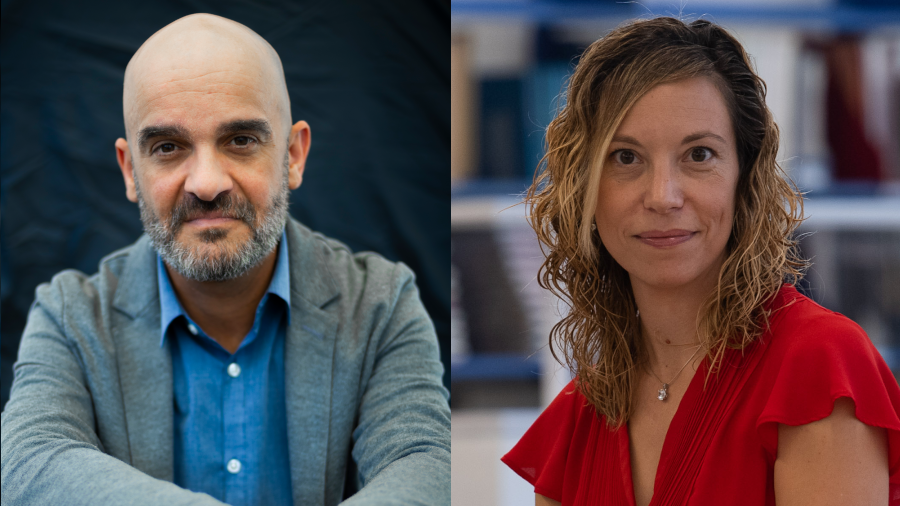Sònia Boadas and Javier Rodrigo awarded Leonardo grants in the area of humanities
Department of Spanish Studies lecturer Sònia Boadas and ICREA Acadèmia researcher and lecturer of the Department of Modern and Early Modern History Javier Rodrigo were awarded Leonardo grants (BBVA Foundation) in their area of expertise.

The BBVA Foundation has awarded a Leonardo grant to Sònia Boadas, lecturer of the Department of Spanish Studies at the UAB, and another grant to ICREA Acadèmia researcher and lecturer of the Department of Modern and Early Modern History at the UAB, Javier Rodrigo. The grants will go towards the development of their projects in the area of the humanities.
Javier Rodrigo (Saragossa, 1977) is ICREA Acadèmia researcher and professor of the UAB. With a PhD in History from the European University in Florence, he was also a Ramón y Cajal researcher at the UAB. He has written or coordinated over 20 books on violence, fascism, civil wars, forced displacements, and concentration camps. He is the main researcher of the European Horizon 2020 projects SO-CLOSE, on the past and present of refugees and forced displacements in Europe, and POS-C-WARS, on the post-civil war periods in Europe. Starting in 2023, he will coordinate a WIRE project on female anti-totalitarian resistances in Europe. His latest books are Generalísimo. Las vidas de Francisco Franco (1892-2020), published by Galàxia Gutenberg, and Ellos, los fascistas. La banalización del fascismo y la crisis de la democracia, published by Deusto (with Maximiliano Fuentes).
Rodrigo will be working on a project on violence against guerrilla women in Spain, entitled "VOLGA, La violència contra les dones en el marc de la guerra contra la guerrilla a Espanya, 1936-1952". The main objective of the project is to analyse the form of violence used against these guerrilla fighters and particularly, the ones fighting alonside anti-Francoist guerrillas in Spain during the Civil War and in the post-war period. It will include an in-depth study of gender-based violence, i.e., specific violence against a person due to their gender, and will lead to a detailed report on not only the violent practices in the New State under Franco, but also the objectives pursued with the identification, imprisonment and elimination of women who represented what the dictatorship called Anti-Spain. VOLGA will contribute to make these facts visible by exposing their stories, contexts and executioners.
Sònia Boadas Cabarrocas (Llagostera, Girona, 1984) is Serra Húnter Lecturer in Spanish Literature at the Universitat Autònoma de Barcelona (UAB), member of the scientific committee PROLOPE (Research Group on Lope de Vega, UAB) and was lead researcher of the Theatheor project on theatre during the Spanish Golden Age, with funding from the Marie Curie Actions. She has formed part of 16 local and international R&D&i projects and has published two monographs, six critical editions, and over 40 book chapters and articles in scientific journals, as well as edited three collective volumes and coordinated four monograph volumes.
With the project “CREATEXT: la creació del text dramàtic al Segle d'Or”, Sònia Boadas aims to analyse six autograph manuscripts by Lope de Vega to contrast the never before explored hypothesis of a collective work in creating and revising his comedies. Is it possible that Lope de Vega worked together with other theatrical agents to decide upon a final text? Boadas’ experience in spectral photography and chemical analysis using spectrometry—techniques which allow recovering illegible fragments damaged by scratches, determine phases in which different passages were rewritten and differentiate the inks used in one same manuscript—will be key to carrying out this project.
Leonardo grants
The Leonardo grants are awarded to fund personal projects presented by researchers and cultural creators in the intermediate stage of their career, aged between 30 and 45 years old, and characteristically with a large production of scientific, technological or cultural material. The grants, which can reach up to 40,000 euros, can be destined to a wide variety of objectives, and thus can be made suitable to the specific needs of each project and be developed in a period of 12 to 18 months. This 2022 call included a total of 884 applications, 60 of which have been awarded grants.